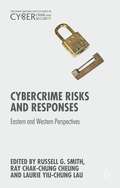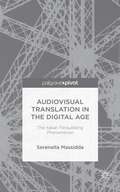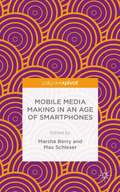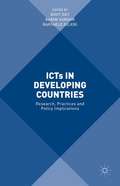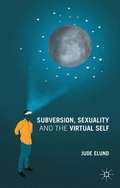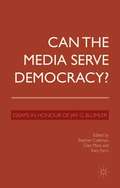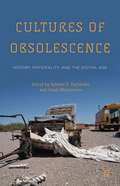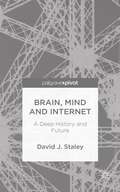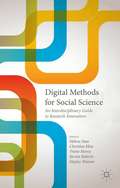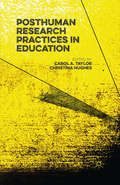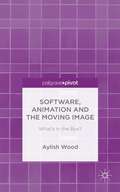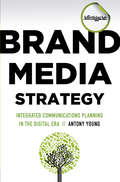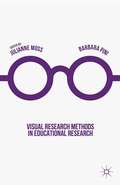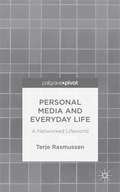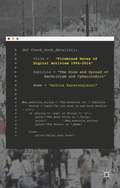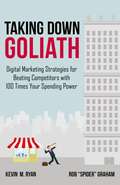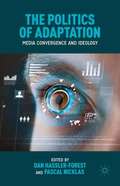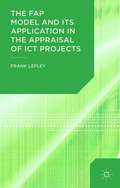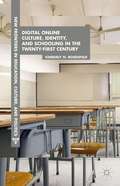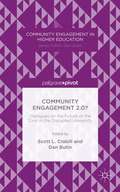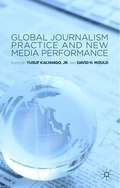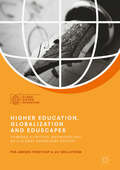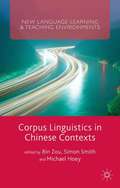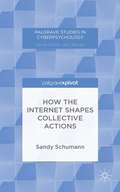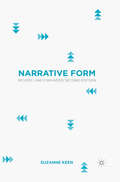- Table View
- List View
Cybercrime Risks and Responses: Eastern And Western Perspectives (Palgrave Macmillan's Studies In Cybercrime And Cybersecurity Ser.)
by Russell Smith Laurie Yiu-Chung Lau Ray Chak-Chung CheungThis book series addresses the urgent need to advance knowledge in the fields of cybercrime and cybersecurity. Because the exponential expansion of computer technologies and use of the Internet have greatly increased the access by criminals to people, institutions, and businesses around the globe, the series will be international in scope. It provides a home for cutting-edge long-form research. Further, the series seeks to spur conversation about how traditional criminological theories apply to the online environment. The series welcomes contributions from early career researchers as well as established scholars on a range of topics in the cybercrime and cybersecurity fields.
Audiovisual Translation in the Digital Age: The Italian Fansubbing Phenomenon
by Serenella MassiddaThis pioneering study on fan translation focuses on Italian fansubbing as a concept, a vibrant cultural and social phenomenon which is described from its inception in 2005 to today. It explores far-reaching issues related to fansubbing and crowdsourcing, highlighting in particular the benefits and drawbacks of Web 2. 0.
Mobile Media Making in an Age of Smartphones
by Marsha Berry Max SchleserWith the rise of smartphones and the proliferation of applications ("apps"), the ways everyday media users and creative professionals represent, experience, and share the everyday is changing. With the overlay of location-based services, these experiences and representations are providing new social, creative, and emotional cartographies. This collection discusses the prospects of the proliferation of mobile and digital filmmaking opportunities, from videographic citizen journalism to networked, transmedia collaborative filmmaking and photography, and the embedding of filmmaking and photography in social media practice. The contributors reflect on emergent creative practices as well as digital ethnographies of new visualities and socialities associated with smartphone cameras in everyday life.
ICTs in Developing Countries: Research, Practices and Policy Implications
by Bidit Dey Karim Sorour Raffaele FilieriICTs in Developing Countries is a collection of conceptual and empirical works on the adoption and impacts of ICT use in developing societies. Bringing together a wide range of disciplines and contributors, it offers a rich examination of digital divide and ICT for development both in terms of contextual information and disciplinary perspectives.
Subversion, Sexuality and the Virtual Self
by Jude ElundThis work explores the construction of identity in digitised and virtual screen environments, specifically investigating the phenomenon of three-dimensional virtual worlds in relation to our physical selves. Using four regions of Second Life as a foundation of analysis, this book explores the issues surrounding the body, embodiment, virtual space and tourism, as well as examining notions of subversion as they relate to gender and sexuality in screen environments. The key arguments put forthin this work have their foundations in poststructuralist theories of the body, primarily examining the issues of bodily perfection, pornography, virtual tourism, virtual sex and subversion. Most important to this analysis are the cultural and social conditions that replicate dominant tropes of power and agency as they are applied to representational practices, such as embodying oneself via an avatar through the screen. The arguments in this book are readily extendible to other on-screen environments due to the proliferation of virtual environments and other social networks which are premised on real-time engagement through digitised interaction.
Can the Media Serve Democracy?
by Stephen Coleman Giles Moss Katy ParryThis landmark collection brings leading scholars in the field of political communication to debate one of the most important questions of our age: Can the media serve democracy? For the media to be democratic, they must enter into a positive relationship with their readers, viewers and listeners as citizens rather than consumers who buy things, audiences who gaze upon spectacles or isolated egos, obsessed with themselves. The media's first task is to remind people that they are inhabitants of a world in which they can make a difference. By enabling citizens to encounter and make sense of events, relationships and cultures of which they have no direct experience, the media constitute a public arena in which members of the public come together as more than passing strangers.
Cultures of Obsolescence
by Babette B. Tischleder Sarah WassermanObsolescence is fundamental to the experience of modernity, not simply one dimension of an economic system. The contributors to this book investigate obsolescence as a historical phenomenon, an aesthetic practice, and an affective mode. Because obsolescence depends upon the supersession and disappearance of what is old and outmoded, this volume sheds light on what usually remains unseen or overlooked. Calling attention to the fact that obsolescence can structure everything from the self tothe skyscraper, Cultures of Obsolescence asks readers to rethink existing relationships between the old and the new. Moreover, the essays in this volume argue for the paradoxical ways in which subjects and their concepts of the human, of newness, and of the future are constituted by a relationship to the obsolete.
Brain, Mind and Internet: A Deep History and Future
by David J. StaleyThis essay places the emerging brain-Internet interface within a broad historical context: that the Internet represents merely the next stage in a very long history of human cognition whereby the brain couples with symbolic technologies. Understanding this 'deep history' provides a way to imagine the future of brain-Internet cognition.
Digital Methods for Social Science: An Interdisciplinary Guide To Research Innovation
by Hayley Watson Steven Roberts Yvette Morey Christine Hine Helene SneeThis timely book inspires researchers to deploy relevant, effective, innovative digital methods. It explores the relationship of such methods to 'mainstream' social science; interdisciplinarity; innovations in digital research tools; the opportunities (and challenges) of digital methods in researching social life; and digital research ethics.
Posthuman Research Practices in Education
by Carol A. Taylor Christina HughesHow do we include and develop understandings of those beyond-the-human aspects of the world in social research? Through fifteen contributions from leading international thinkers, this book provides original approaches to posthumanist research practices in education. It responds to questions which consider the effect and reach of posthuman research.
Software, Animation and the Moving Image: What’s in the Box?
by Aylish WoodSoftware, Animation and the Moving Image brings a unique perspective to the study of computer-generated animation by placing interviews undertaken with animators alongside an analysis of the user interface of animation software. Wood develops a novel framework for considering computer-generated images found in visual effects and animations.
Brand Media Strategy: Integrated Communications Planning in the Digital Era
by A. YoungToday's sophisticated media landscape offers more tools and platforms, for the savvy marketer than ever before. Media & brand expert Antony Young explores how today's most innovative marketers are meeting the challenge by employing the latest media tools in ways never before seen to grow their brands, and getting unprecedented results.
Visual Research Methods in Educational Research
by Julianne Moss Barbara PiniHave you noticed there is a burgeoning take up of visual research in education? Are you considering using visual research as part of your next research project or revitalising your research methods course? For researchers who are new to the field of VRMs in education there is little critical literature on the subject. This book addresses the gap in the literature and brings together some of the leading educational researchers engaging and reflecting on the visual from Australia, the UK and Canada. Encapsulated in a single volume, this book sets out theoretically grounded discussions of the possibilities and challenges of the approach for educational researchers around four key themes: images of schooling, performing pedagogy, power and representation and ethical issues in educational research.
Personal Media and Everyday Life: A Networked Lifeworld
by Terje RasmussenThis book addresses the widespread use of digital personal media in daily life. With a sociological and historical perspective, it explores the media-enhanced individualization and rationalization of the lifeworld, discussing the dramatic mediatization of daily life and calling on theorists such as McLuhan, Habermas and Goffman.
Firebrand Waves of Digital Activism 1994–2014: The Rise and Spread of Hacktivism and Cyberconflict
by Athina KaratzogianniFirebrand Waves of Digital Activism 1994–2014.
Taking Down Goliath
by Kevin M. Ryan Rob Spider" GrahamAdvances in software, auction-based media, analytics, and big data have made it possible for the average marketer to compete with marketers with 100 times the spending power. Taking Down Goliath profiles the ways in which digital marketing can level the playing field, if you know how to use it.
The Politics of Adaptation
by Dan Hassler-Forest Pascal NicklasIn the 21st century, the parallel movements of media convergence and globalization have reshaped our understanding of media boundaries. The rise of digital culture has increased our access to narrative media, while also providing new ways of engaging with them. But, at the same time, global media corporations have intensified their power over these media and the channels through which they reach us. This book brings together a broad range of scholarly approaches to the challenges and opportunities of adaptation studies in this new era. Together, they focus on the political and ideological tensions that underlie and shape processes of adaptation and cultural transformation in the age of media convergence.
The FAP Model and Its Application in the Appraisal of ICT Projects
by Frank LefleyVarious formal techniques are used for the analysis of capital projects, but are often limited by their scope and by the difficulty of interpreting the significance of the results they produce. Many perceived benefit factors are left out of existing appraisal processes because they lack precise financial quantification. Significantly revised and rewritten, based on the 2005 publication The Financial Appraisal Profile Model; this book discusses how the FAP model can present an integrated process for the appraisal of financial and strategic benefits and the assessment of risk in ICT (Information Communication Technology) project proposals. It presents a pragmatic solution to resolve many of the problems faced by organisations considering investment, not only in ICT but in all medium to large scale projects. The book demonstrates how the FAP model progresses the literature and practice of corporate finance by profiling the financial, risk and strategic elements of an investment decision. Including a review of other existing financial risk and strategic appraisal models, this book explores the perception that ICT projects have different requirements to others, and highlights important issues regarding ICT globalisation, project champions, post audits and appraisal teams. This comprehensive case-study, based on research in applying the FAP model to an ICT capital project, addresses issues such as 'groupthink' and the influence of a 'project champion' on the evaluation of capital projects.
Digital Online Culture, Identity, and Schooling in the Twenty-First Century
by Kimberly N. RosenfeldDigital Online Culture, Identity and Schooling in the Twenty-First Century provides a cultural, ideological critique of identity construction in the context of virtualization. Kimberly Rosenfeld explores the growing number of people who no longer reside in one physical reality but live, work, and play in multiple realities. Rosenfeld's critique of neo-liberal practices in the digital environment brings to light the on-going hegemonic and counter-hegemonic battles over control of education in the digital age. Rosenfeld draws conclusions for empowering the population through schooling, and how it should understand, respond to, and help individuals live out the information revolution.
Community Engagement 2.0?: Dialogues on the Future of the Civic in the Disrupted University
by Scott L. Crabill Dan ButinAs higher education is disrupted by technology and takes place less and less on campus, what does meaningful community engagement look like? How can it continue to enrich learning? In Community Engagement 2. 0?, Crabill and Butin convene a dialogue: five writers set out theoretical and practical considerations, five more discuss the issues raised.
Global Journalism Practice and New Media Performance
by Yusuf Kalyango Jr David H MouldGlobal Journalism Practice and New Media Performance provides an overview of new and traditional media in their political, economic and cultural contexts while exploring the role of journalism practice and media education. The authors examine media systems in 16 countries, including China, Russia and the United States.
Higher Education, Globalization and Eduscapes: Towards A Critical Anthropology Of A Global Knowledge Society (Palgrave Studies in Global Higher Education)
by Per-Anders Forstorp Ulf MellströmThis book examines transnational scapes and flows of higher education: arguing that the educational and political vision of a national, regional and global knowledge society needs to be perspectivized beyond its ethnocentric conditions and meanings. Using eduscapes as its most important concept, this book explores the educational landscapes of individual as well as institutional actors; particularly the agential aspects of how global eduscapes are imagined, experienced, negotiated and constructed. In addition, the authors highlight the critical potential of anthropology, using this perspective as a resource for cultural critique where the Western experience and assumed ‘ownership’ of the global knowledge economy will be put into question. This comprehensive book will appeal to students and scholars of educational policy, the sociology of education and the globalization of education.
Corpus Linguistics in Chinese Contexts (New Language Learning and Teaching Environments)
by Simon Smith Bin Zou Michael HoeyRapid advances in computing have enabled the integration of corpora into language teaching and learning, yet in China corpus methods have not yet been widely adopted. Corpus Linguistics in Chinese Contexts aims to advance the state of the art in the use of corpora in applied linguistics and contribute to the expertise in corpus use in China.
How the Internet Shapes Collective Actions
by Sandy SchumannAfter a Facebook rebellion in Egypt and Twitter protests in Turkey, the internet has been proclaimed as a globe-shifting, revolutionizing force that can incite complex social phenomena such as collective actions. This book critically assesses this claim and highlights how internet use can shape mobilizing processes to foster collective actions.
Narrative Form: Revised and Expanded Second Edition
by Suzanne KeenThis revised and expanded handbook concisely introduces narrative form to advanced students of fiction and creative writing, with refreshed references and new discussions of cognitive approaches to narrative, nonfiction, and narrative emotions.
